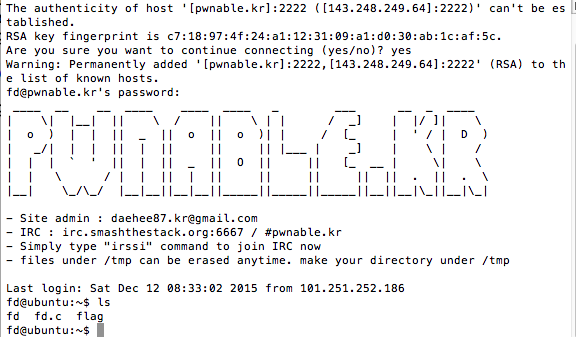Toddler's Bottle [fd]
12 Dec 2015 • LeanderDescription: [fd] is a 1 point challenge hosted on the online wargame site pwnable.kr. The challenge involves understanding file descriptors and a little bit of C code. A login is required to be able to access the challenges because the site keeps score between competitiors that are registered and undergoing challenges.
When first accessing the challenge we are provided the following information:
Mommy! what is a file descriptor in Linux?
ssh fd@pwnable.kr -p 2222 (pw:guest)At the beginning
So now we access the challenge through connecting via ssh and then we are provided three files.

Next let’s examine the source code. First we can see on line 8 the program expect to receive at least one argument and that it expects it to be a number. Next on line 12 a variable called fd is assigned a value based on argv[1]. Next on line 14, the program reads up to 32 characters from the variable fd, places it into another variable buf. Between lines 16 and and 19 the program compares the value in buf to "LETMEWIN\n". Last it either gives us the flag or gives us a hint that we need to learn about Linux file IO\n"
1
2
3
4
5
6
7
8
9
10
11
12
13
14
15
16
17
18
19
20
21
22
#include <stdio.h>
#include <stdlib.h>
#include <string.h>
char buf[32];
int main(int argc, char* argv[], char* envp[]){
if(argc<2){
printf("pass argv[1] a number\n");
return 0;}
int fd = atoi( argv[1] ) - 0x1234;
int len = 0;
len = read(fd, buf, 32);
if(!strcmp("LETMEWIN\n", buf)){
printf("good job :)\n");
system("/bin/cat flag");
exit(0);}
printf("learn about Linux file IO\n");
return 0;}
Making mistakes and not paying enough attention
To begin with I thought that I needed to pass the program a hexidecimal value that would equal LETMEWIN\n and make sure that it was at least 0x1234 greater than my input. For example: I converted all the ascii to hex using python -c 'import binascii; print binascii.hexlify("LETMEWIN\n");' which produced 4c45544d4557494e0a and then I added 0x1234 manually.
Solving the problem
After about 40-60 minutes of frustration I realized that this was a file descriptor problem and that really what I needed was to use the read()1 on line 14 to take advantage of this.
In linux/unix operations systems there are generally three standard file descriptors that are always predefined 0, 1, and 2.2 After realizing this, I simply calculated the decimal value for 0x1234, which is 4660 and added 1. When I input the value 4661 it set in motion the solution to get the flag.
Here is how it worked:
- Execute the program with the value we calculated,
./fd 4661 - The progam validates that it has at least one argument at line 8.
- Line 12 converts our ascii input into an integer; subtracts the hex value 0x1234 (also 4660 in decimal); and then assigns the value to the integer variable
fd. - Line 14 then executes a read of fd, which now reads from
stdin(remember the value of fd is 1 now?) - The program is now waiting for input, so now we
type in LETMEWIN and enter. Keep in mind when we hit enter it will automatically send the “\n” that we need. - Problem solved and now we got our flag!
Here’s how it looks when you take the correct steps - notice I left off the flag. The real practice is going and doing this for yourself!

Footnotes:
-
Read() is a standard C library function. it’s prototype looks like:
read(int fildes, void *buf, size_t nbyte). Read() attempts to read nbyte bytes of data from the object referenced by the descriptor fildes into the buffer pointed to by buf. ↩ -
File descriptor 0 is stdin; file descriptor 1 is stdout; and file descriptor 2 is stderr. Go here to learn about streams and file descriptors. You can also learn about standard file descriptors provided by the linux/unix operations systems here. ↩